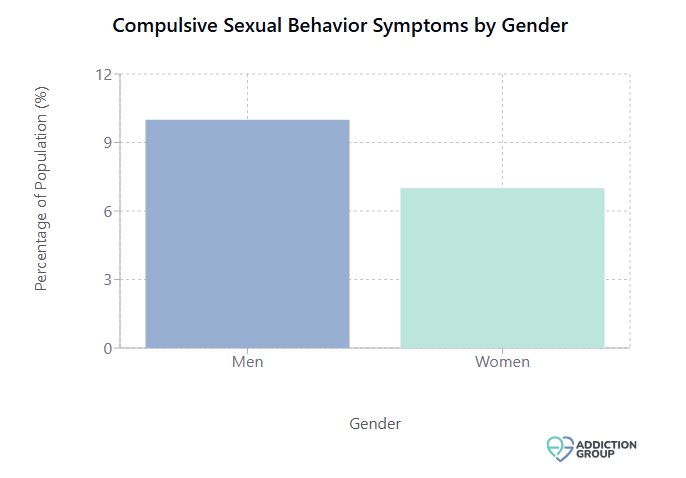Quiz: Am I Hypersexual?
○ DISCLAIMER
The quizzes and content on this website are designed for entertainment purposes only and should not be used as a basis for making personal decisions about your sexuality, gender identity, or any other life choices. These quizzes are not diagnostic tools and cannot determine your identity or orientation. If you're questioning your identity or need support, we strongly encourage you to seek guidance from qualified LGBTQ+ friendly professionals or counselors. Remember that your journey of self-discovery is unique and personal to you.

Imagine you’re walking through a dark forest with a compass in your hands. The needle spins wildly, pointing first in one direction, then another. You realize you’re lost, but you can’t figure out whether the compass is broken or you’re in a place with an anomalous magnetic field. This is roughly how people feel when confronted with questions about their own hypersexuality. Their internal compass of desires works differently than others’, but understanding whether this is normal or problematic is nearly impossible without help. That’s exactly why we created this quiz – to help you navigate the intricacies of your own sexuality.
Understanding Hypersexuality: What Is It?
Hypersexuality isn’t simply “wanting sex really badly.” It’s a complex psychological condition where sexual thoughts, fantasies, and behaviors become obsessive, interfering with normal life and causing significant distress. Unlike healthy high libido, hypersexuality is characterized by loss of control and compulsiveness.
From a neurobiological perspective, hypersexuality is linked to disruption in the brain’s reward system. Dopamine pathways responsible for pleasure and motivation become hypersensitive to sexual stimuli. This creates a vicious cycle: a person seeks sexual release not so much for pleasure as to relieve internal tension, much like a nicotine addict smokes not for enjoyment but to eliminate discomfort.
It’s important to understand that hypersexuality is often a form of emotional regulation. People may use sexual behavior as a coping mechanism for stress, anxiety, depression, or traumatic experiences. Sex becomes a kind of “painkiller,” temporarily dulling emotional pain.
What Is This Quiz For?
Our quiz isn’t a medical diagnostic tool, but rather a mirror for self-discovery. It’s designed to help you:
- Recognize patterns in your behavior. Many people are so immersed in their habits that they don’t notice when they cross the line between normal and compulsive behavior. The quiz structures your reflections, helping you see the complete picture.
- Assess how sexuality affects your quality of life. The key question isn’t how much sex you want, but whether this desire interferes with living a full life. The quiz focuses precisely on this aspect.
- Understand whether you need professional help. Quiz results can serve as a starting point for conversations with a psychologist or sexologist. They provide language to describe what you’re feeling.
- Remove stigma and feelings of shame. Realizing that your experiences have a name and that you’re not alone in your struggle can bring enormous relief.
Signs of Hypersexuality Underlying Our Quiz
The quiz is built on key markers that distinguish healthy sexuality from compulsive behavior. Each question is carefully crafted to reveal not just the frequency of sexual desires, but their impact on your daily life, emotional state, and ability to control your impulses. Let’s examine the main signs on which our assessment is based.
Intrusive Sexual Thoughts
Imagine trying to concentrate on an important presentation, but the same sexual fantasy keeps spinning in your head. You push it away, but it returns again and again, like an annoying melody. With hypersexuality, such intrusive thoughts can occupy several hours a day, seriously affecting productivity and concentration.
These thoughts differ from ordinary sexual fantasies in their intrusiveness – they invade consciousness against the person’s will, causing discomfort and anxiety. A person may experience them even in completely inappropriate situations: at a business meeting, in a place of worship, at a family dinner.
Compulsive Sexual Behavior
Compulsiveness manifests as an inability to resist sexual impulses, even when reason says “stop.” This can be expressed through:
- Hours of pornography viewing despite fatigue and other obligations
- Constant searching for new sexual partners through dating apps
- Obsessive masturbation, sometimes to the point of physical injury
- Risky sexual behavior without considering consequences
The key point is that a person continues such behavior even while recognizing its negative consequences. This is similar to how someone with an eating disorder continues overeating despite health problems.
Using Sex as an Emotional Regulator
With hypersexuality, sex becomes a universal “medicine” for any negative emotions. Sad – need sex. Anxious – sex. Bored – sex. Anger, loneliness, disappointment – everything gets “treated” with sexual activity.
The problem is that this creates a vicious cycle. Instead of developing healthy coping mechanisms for emotions, the person increasingly relies on sexual behavior. Over time, the “dose” must increase – more partners are needed, more extreme practices, more frequent activity.
Negative Consequences for Relationships
Hypersexuality can destroy relationships in numerous ways:
- Constant dissatisfaction with partners. No one can satisfy an insatiable need.
- Infidelity and deception. Compulsive need for novelty drives the search for other partners.
- Emotional unavailability. All energy goes toward sexual fantasies and behavior.
- Sexual pressure on partners. Constant demands for sex create toxic dynamics.
Partners of people with hypersexuality often feel like objects rather than loved ones. They may develop complexes related to their own attractiveness when they realize that even their maximum efforts cannot satisfy their partner.
Loss of Control and Feeling of Powerlessness
The most agonizing aspect of hypersexuality is the awareness of losing control. A person may make promises to themselves: “Today I won’t watch porn,” “I’ll delete dating apps,” “This was the last time.” But a few hours pass, and compulsion defeats willpower.
This feeling of powerlessness is devastating to self-esteem. The person begins to perceive themselves as weak-willed, depraved, incapable of normal relationships. Shame and self-judgment only intensify the need for emotional “numbing” through sex.
Conclusion: The First Step to Understanding Yourself
If you recognized yourself in the described signs while reading this article – don’t panic. Recognizing the problem isn’t a sentence, but the beginning of a path to healing. Our quiz will help you structure your observations and understand how serious the situation is.
Remember: the desire for sexual pleasure is a normal part of human nature. Problems arise only when this desire begins to control your life, rather than you controlling it. The quiz will help you understand where this boundary lies specifically for you.
Whatever the result, treat yourself with compassion. Hypersexuality isn’t a moral defect, but a psychological condition that can and should be treated. The first step is honestly answering the quiz questions. The second is seeking professional help if necessary.
Your internal compass may have lost its way, but that doesn’t mean you’re doomed to wander in darkness. The quiz is a flashlight that will help illuminate the path to understanding yourself and, ultimately, to a healthier and happier life.

Source: Addiction Group
○ Related Quizzes
Questions Overview
- Rarely, can easily concentrate
- A couple of times a day, but quickly return to tasks
- Need to take breaks every hour
- Constantly, can't focus on tasks
- Can handle any duration calmly
- Become irritable after a week
- Feel discomfort after 2-3 days
- Can't handle even a day
- Less than 15 minutes or don't watch at all
- 30-60 minutes
- 2-3 hours
- More than 4 hours
- Almost never
- Sometimes in romantic settings
- Regularly in public places
- Constantly, even at work/school
- Never
- Sometimes spend on dates
- Regularly buy intimate accessories
- Spend a significant part of budget on satisfying desires
- Never
- Rarely, after casual encounters
- Often, but continue anyway
- Constantly, but can't stop
- As long as needed
- Several months
- Couple of weeks
- Maximum couple of days
- Rarely
- Sometimes when stressed
- It's my main way to fight negative emotions
- Constantly, it's the only thing that helps
- 0-1
- 2-4
- 5-10
- More than 10
- Never
- Rarely, in special cases
- Regularly late because of this
- Constantly missing important events
- As long as necessary
- Up to a month
- Maximum a week
- No more than a day
- Never
- Rarely, but with protection
- Regularly take risks
- Constantly neglect safety
- 0-1 times per day
- 2-3 times per day
- 4-6 times per day
- More than 6 times per day
- Rarely
- Several times a week
- Several times a day
- Constantly, with everyone I meet
- None
- 1-2 dating apps
- 3-5 different apps
- More than 5, including specific ones
- Only when appropriate
- Regularly with close friends
- In most conversations
- It's the main topic of all conversations
- Minimum or nothing
- Up to 10% of income
- 25-30% of income
- More than 30% of income







